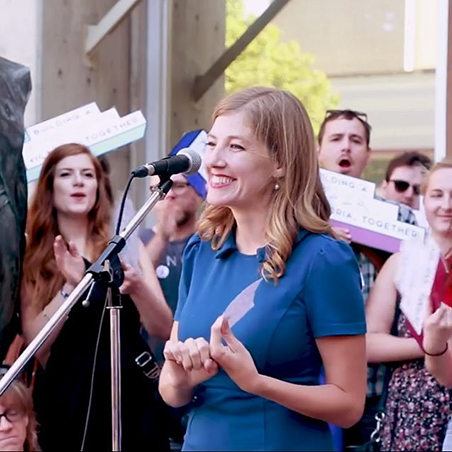Laurel Collins
Lecturer, University of Victoria; City Councillor, Victoria
Bachelor of Arts, Classics, 2009
I realized I wanted to work on some of these issues before they turned into more violence and loss of life.
It was mid April in 2011. Laurel Collins was walking through the market in the Northern Uganda city of Gulu. She was working with the office of the UN High Commissioner for Refugees—her field placement as she finished up her Masters degree at Royal Roads University in Victoria.
“I was heading home when suddenly the market just exploded into tear gas and machine gun fire,” she says.
Laurel had never been so close to violence. It was terrifying.
“One of the vendors pulled me aside, got me in a taxi and I got home safely. But over the next few days the city just went up in flames!”
It was called the Walk to Work Protest—a tipping point response to a government insensitive to the rising cost of fuel and high cost of living. It was the Ugandan version of the Arab Spring. As happened elsewhere the military clamped down.
Five people died, dozens were injured, and hundreds arrested.
“That was a turning point for me,” Laurel says. “I realized I wanted to work on some of these issues before they turned into more violence and loss of life.”
Over the next few years Laurel pursued that goal. She began a PhD at the University of Victoria.
“I wanted to look at social movements and how people respond to conflict and how nonviolence is a potential alternative response. My time at King’s studying Classics and Contemporary Studies laid the groundwork for my theoretical approach to this.”
While working on her thesis Laurel also teaches Social Justice Studies and Political Sociology.
“The kind of learning that I received at King’s is the kind of learning I want to provide for my students. It’s discussion based. Students are encouraged to dig into the material and think critically.”
Outside the hallowed halls of the University of Victoria Laurel’s approach to social inequality is anything but theoretical. In 2018 she did something she had never considered.
“I was doing some activism work around environmental justice and a couple of city councillors approached me about running for Victoria city council. But politics is a different arena from teaching and this sort of wonderful bubble I had created for myself. I went back and forth. But a lot of the things I want to see changed in the world and how I can bring change to my community can be amplified through politics and I thought I could be so much more effective in that role.”
Laurel ran on a platform of bringing affordable housing to the city. She was elected with the most votes of any non-incumbent ever in Victoria and she took her place in the august surroundings of the flagged draped council chamber.
“In my first council meeting it felt like oh my gosh, what am I doing in this room? And, I still have a bit of the wonder each time I sit at the council table, but it’s being able to create policy and see the impacts in my community that has me in awe of this incredible opportunity.
While she’s gotten used to her surroundings, for Laurel the importance of social justice is not something one gets used to. She says, “I have been kept up at night worrying about creating policies that have a negative impact. We make decisions that affect people’s lives. I feel the weight of that responsibility and I will do everything in my power to live up to it.”
 Connect with Laurel Collins
Connect with Laurel Collins